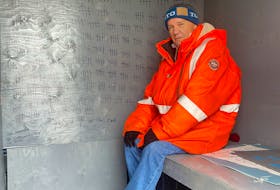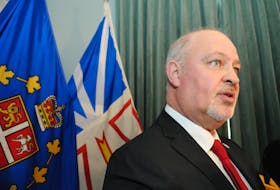
Being on an island at an easterly point in North America, Newfoundlanders and Labradorians know a thing or two about boats.
Just how much knowledge they have of cultural diversity — or, perhaps more importantly, their readiness to embrace it as their future — is another ship altogether.
The connection between boats and cultural diversity, says Grenfell professor Ivan Emke, is that if there’s no effort to embrace different cultures it goes beyond missing the boat.
“We find intercultural interactions are tricky things,” the facilitator of internationalization at Grenfell Campus, Memorial University said last week. “If we are not even trying, then we have lost. We have not just missed the boat, we are not even in the ferry terminal.”
Emke spoke to the Rotary Club of Corner Brook recently about the impacts of cultural diversity on campus and throughout the city and region. He characterized it as a “Kodak moment” — not in the sense of capturing an image, but if you refuse to accept that the world is changing, you will be left behind.
“As you go west, Canada changes fairly dramatically,” he said, referring to the diversity of cultures and people dispersed throughout the population.
“It hasn’t hit us quite yet, but it is going to.”
Within a global world, there is an intelligence of intercultural sensitivity and awareness, says Emke. People have to be prepared and versed in it. In a country that accepts more immigrants than any other, he said, it becomes the strength of its future.
From an academic standpoint, both in teaching and community focus, it is vital to have an emphasis on cultural diversity. Incorporating that into a curriculum is tricky, the professor said, but there is an effort to do so.
Sometimes, especially in Newfoundland and Labrador, students’ introduction to a person of a different race or culture comes in university or college. It may be an international student or even an instructor.
“In some ways, it’s more important for us at Grenfell to do this than many other universities, because many of the domestic students we get are disadvantaged when it comes to intercultural experiences,” Emke said. “They come from varying monocultural backgrounds.”
Despite its appearance as a monocultural city, Corner Brook has a history of people coming here from varying backgrounds.
International students are part of the Grenfell community, and there are faculty and staff from various backgrounds. The professor does not claim to have the answers, or say that Grenfell has it figured out, but it also most move outside the educational institute to within the city and region.
As they pay a higher tuition fee, Emke says some might claim it is an economic push from a university standpoint. However, that is not what is important to him.
“The value of those international students is far greater to us than the money they bring in,” he said, acknowledging it may not be a sentiment shared by everybody at the university.
However, he also recognizes that increasing the international student population is the only way to make Grenfell a sustainable campus. The local demographics are against maintaining or growing enrolment.
“If we want to grow, which is the plan by 2020, that has to come from international students,” he said.
The province, through its population growth strategy, has also recognized the importance of immigrants in overcoming its own demographic challenges.
“We can always argue, if you want youth in your province, one of the ways to get young people to immigrate into Newfoundland and Labrador is to give them an education here, get them hooked into whatever industry they are involved in, get them to know Newfoundlanders and start to feel at home here,” he said.
“The chances of them staying are much higher if you make it possible through an immigration strategy.”








